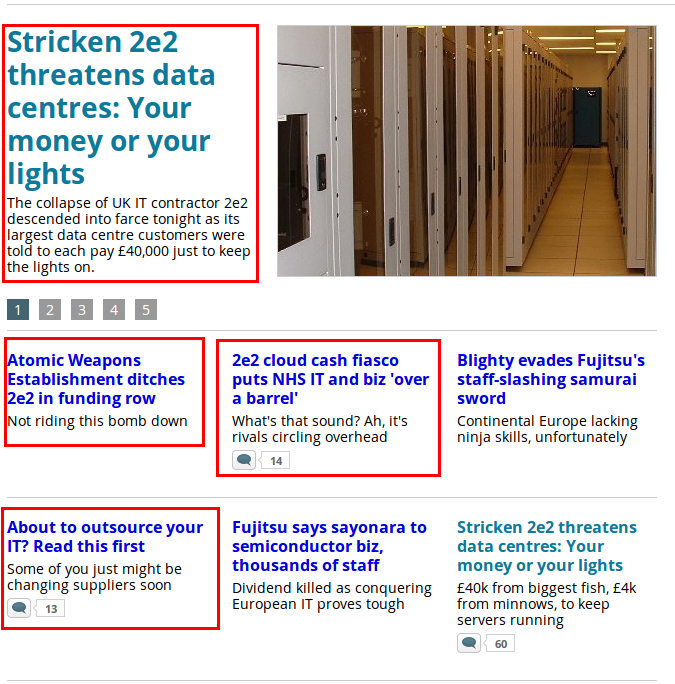From “Berkshire bigboy 2e2 in the pink - apart from crushing debt burden” (29th June 2012) and “Integrator-reseller 2e2 ‘broke banking covenant’, hits credit buffers” (9th Jan 2013) leading to “UK’s 2e2 goes titsup” (29th Jan 2013 ) those following 2e2 will have seen the writing on the wall.
2e2 released a statement to eHealth Insider saying the company had a, “strong underlying business” and remained “highly focussed upon our NHS and health customers which are core to our vision. We have not missed any bank interest payment and the interest that we actually have to pay is smaller than the total interest that has been cited in the past,” the spokesman said.
Can 2e2 be trusted anymore? The spokesperson says “We have not missed any bank interest payment and the interest that we actually have to pay is smaller than the total interest that has been cited in the past” yet “[2e2s] liquidity issues came to prominence in 2012 when two County Court Judgments were issued to 2e2 over late payments of debts: one for £14,000 in September and one for nearly £40,000 in June.”
“…staff running IT services at Sussex Partnership NHS Trust (SPNT) to down tools. SPNT signed a seven-year outsourcing contract with 2e2 in April that was worth 5m in its first year and 36.8m in total - the largest job on 2e2’s books. Contacts close to the 40 bods working on that NHS contract told us this morning that contractors and permanent 2e2 employees still had not been paid despite assurance from FTI. “The programme director was on site and a couple of desktop [services] people, only a handful,” said one well-placed source. “The administrator has failed in its commitment to the trust to provide continuity of service and people,” claimed another.”
What will happen in my back yard (NHS North Central London Cluster) and for the other Trusts using 2e2?
As Oliver Huitson writes on openDemocracy / ourNHS: “Markets rely on failure. But for health services “failure” can be literally fatal.”
“As Services 2e2 provide to London PCTs were previously done in-house but outsourced some years ago, according to a staff member. More details will surely emerge over the coming days but if the picture is accurate it highlights once again the dangers of mixing markets - and failure - with essential public services. When Railtrack failed - the ill-fated private owner of Britain’s rail network - it had to be renationalised after scores of people lost their lives in three major crashes.
There are also concerns over the loss of skills and institutional capabilities when services are outsourced, the state’s operational memory is not infinite and after prolonged periods it can be difficult and expensive to bring services back in-house.”
“2e2 grew at an accelerated rate through multiple acquisitions and almost wholly on borrowed money. It paid over £50m to acquire Compel and followed that with its acquisition of Morse Group in 2010, a business at the time of similar size to 2e2, paying a little over £70m. Its initial forays attracted Duke Street Capital and then Hutton Collins at around the time of the Morse acquisition. But 2e2 has not made a pre-tax profit for many years. In the last five years to December 2011, its accumulated pre-tax losses amount to around £135m. Its interest payments over the same five-year period totalled some £145m. Operating profit declined from £11m in 2009 to £7m in 2010 and finally £2m in 2011 - this despite increases in revenue each year given acquisitions. There is no escaping the fact that 2e2’s UK biz was essentially a “zombie”, one of a legion of businesses saddled by enormous unsustainable debt and whose profits were simply unable to cope with interest payments. Sure, some interest payments may not actually be payable until the VCs take their final bow, but who in their right mind will look at the accumulated value of rising debt and take it on?”
Blame 2e2! Blame the NHS organisation! Blame the workers! Next thing people will be blaming Gordon Brown, The ash cloud, Giant vampire squids or the wrong type of snow….. Any which way the market is clearly broken for any business model that depends on leveraged debt for operational expenditure; from South London Trusts to Managed Service providers…. It’s broken further still by contractual relationships that are over many years, closely linked with dead costs of licenses and dependent on further abstraction of relationships between the ‘business’ and the IT organisation. When clinician, technician and PM functions can work closely together they can create and deliver meaningful digital services; when everything is managed via a service desk to a subcontracted third party the ties are too weak, leading to low quality outputs.

Well, that’s my 2e2p worth anyway….